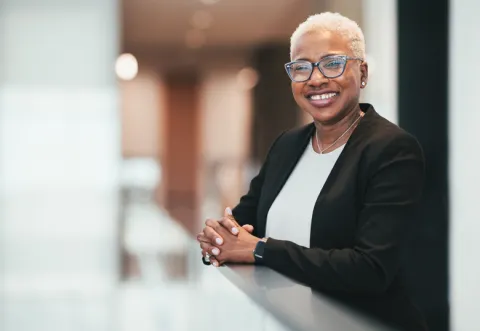Equity, Diversity & Inclusion
Accessibility, Belonging & Community
Interview with Martha Mathurin-Moe, Vice Provost, Accessibility Belong & Community
The University of Lethbridge is committed to ensuring our institution embraces the values of accessibility, belonging and community.
Martha Mathurin-Moe, the University of Lethbridge’s Vice-Provost, Accessibility, Belonging & Community, was kind enough to take some time out of her busy schedule to answer a few questions for me. Originally from a small island in the Caribbean, Martha came to Canada to complete her graduate program, and lucky for us, she never left. Before coming to ULethbridge, she worked for the Government of Saskatchewan’s Public Service Commission as a talent development manager and previously for the University of Regina as the associate director for study abroad programs. The below interview addresses community, collective responsibility, and safety.

"It's about disrupting preconceived notions that come from our socialization."
What can we do collectively to make ULethbridge an inclusive and supportive space?
I think it’s about finding a community to support you. I don’t like us to be siloed, but I think you need the uniqueness of your community to walk along with you on this journey but also to feel represented in the space. Going to post-secondary is quite an overwhelming task, contrary to what people think, and students need a bit of community around them.
We need to understand that creating safety on campus is not one person’s job. It is all of us. Together. Working towards a common outcome. For example, if you see your classmate not being okay or in a safe place, you have to either help them or direct them to the resources to help them without putting yourself in harm’s way. If everyone sees this as a collective responsibility, not an individual or an office responsibility, we will get the campus we want—a campus where everyone feels safe, valued and included.
It’s about not being a complicit bystander when you see someone mistreated. We have a voice and should be calling out behaviours. It’s about disrupting preconceived notions that come from our socialization or experiences. Many of us have grown up with preconceived notions about things and people and places that are different to us, and most of the time, these notions come from a very deficit way of thinking. If we can learn and educate ourselves, disrupt ourselves, become an ally, call out behaviours when we see them, we collectively work towards a common good of creating a safe, inclusive campus.
We need to get away from the hesitation around talking about the tough stuff like mental health, race and gender. We should have robust conversations while also supplying the resources to support you through this.
Is there anything you would like students to understand?
If something is not a part of our reality or it doesn’t affect us immediately, then we think, ‘well, why should I worry about it?’ Contradict this by thinking about creating a legacy and moments of impact. What you do today is going to impact tomorrow, the future. Think about it for future generations, your friends, your kids, or your family. You want to make it a better place for them to come to and study, so do your part in collectively working to build this future.
I want our community to understand that we as an institution have an opportunity ahead of us. We can decide whether we embrace it.
We can actually be a leader within our community. A leader in making THIS city a city where people want to live, study and build a life. That is all I’m concerned about, creating a lasting effect so that when people come to Lethbridge, it’s a place they want to be. I know we can get there, but we have to do it together, not in isolation.
Is there anything else you would like to add?
I will always make time for students. Even though my schedule is nuts, I will make time. Students are the reason we’re here. They could decide to go elsewhere, but they chose ULethbridge. So we need to make it a unique, transformative, inclusive experience for them. I will always make time for students because I need to know what’s going on with them. If they have an idea, recommendation or project they would like to collaborate on, I’d be happy to speak about that. Students should feel free to reach out. Send an email. Or if you see me in the hallway and want to stop and say ‘hello,’ I’d love that. I’m trying to learn everyone’s names and faces.
